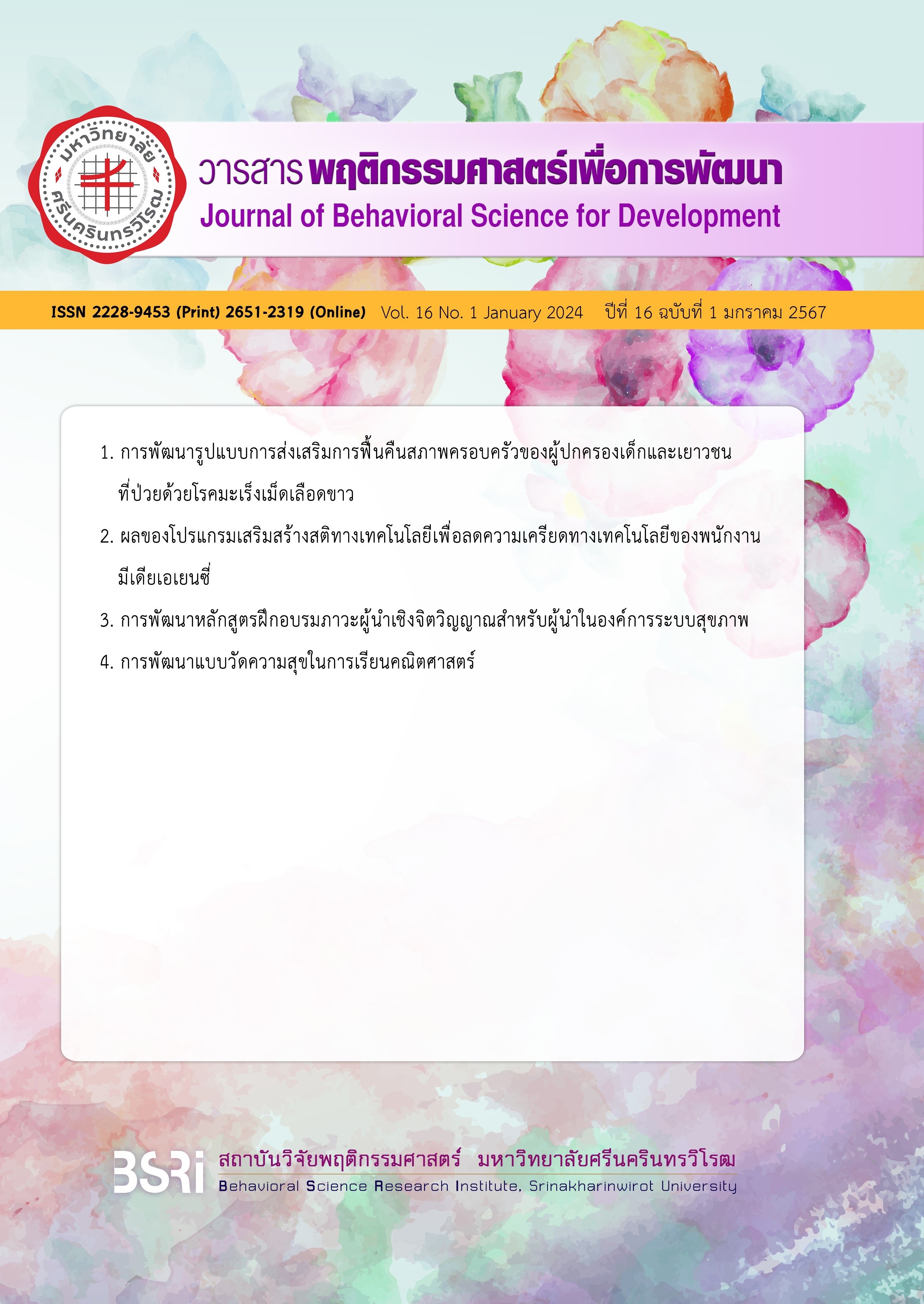Creating of Spiritual Leadership Program for Leaders in a Healthcare Organization
Keywords:
Spiritual leadership, leaders in organizations, training program, quasi - experimental research, effectiveness of programAbstract
This study design applied the quasi - experimental research with randomized pretest-posttest control group design and primarily aims to develop a spiritual leadership program as well as to develop and validate a handbook on training spiritual leadership for leaders in a healthcare organizations. The study participants consisted of 62 leaders in a healthcare organizations (i.e., executives, managers, and those who were prepare to be promoted to manager or executive). The participants were divided into two groups, 32 participants were in the experimental group and 30 were in the control group by simple random sampling. Both quantitative and qualitative data collection were performed. Results: 1) the program and handbook on training spiritual leadership for leaders in organizations were obtained. This program consisted of four modules: module 1 connectedness to self and one’s own spirituality, module 2 connectedness to others and society, module 3 development of spiritual leadership, and module 4 follow-up after spiritual leadership training. 2) For the try-out to validate the effectiveness of training program, results revealed that spiritual leadership of the leaders attending the spiritual leadership program was significantly higher than those who did not attend the program (p < .05). In addition, results of the qualitative data revealed that the leaders who attended the program had greater knowledge and understanding about spiritual leadership. Also, their spiritual leadership had increased, connectedness to self, others, and society had developed.
References
Ashmos, D. P., & Duchon, D. (2000). Spirituality at work: A conceptualization and measure. Journal of Management Inquiry, 9(2), 134-145. https://doi.org/10.1177/105649260092008
Bangkok Business News. (2022, May 1). More than 77,000 Thai workers resigned, 87% found to be stressed out, working unhappily. https://www.bangkokbiznews.com/social/1001962 [in Thai]
Boonpadung, D., Girdwichai, L., Nattapong, T., Chancharoen, S., & Charoenwiriyakul, C. (2019). Factors affecting individual spirit at work of healthcare professionals in crowns prince hospitals Thailand. Journal of the Association of Researchers, 24(2), 40-50. [in Thai]
Cho, S. L. (2021). The impact of spiritual leadership on absenteeism through a serial mediation of workplace spirituality and job satisfaction. Elementary Education Online, 20(5), 7071-7081. https://doi.org/10.17051/ilkonline.2021.05.800
Chongvisal, R. (2018). The development of spiritual health and workplace spirituality. Thai Health Promotion Foundation. [in Thai]
Chongvisal, R. (2019). A study of developing spiritual health and workplace spiritual in private hospital staff. Thai Health Promotion Foundation. [in Thai]
Chongvisal, R. (2021). Organizational Psychology (5th ed.). Chulalongkorn University Press. [in Thai]
Chongvisal, R. (2023). Leadership: Theories, research, and approaches to development (5th ed.). Chulalongkorn University Press. [in Thai]
Chongvisal, R., Asdornnithee, S., Chotisakulrat, P., & Phokthawee, V. (2021). Toward human potential: A manual for organizing the spiritual development process (3rd ed.). Asia Digital Press. [in Thai]
Chongvisal, R., Asdornnithee, S., Thongkambanjong, S., Phokthawee, V., & Sitthiwanthana, A. (2021). The conceptualization and dimensions of spiritual health in working-age of Thailand. Thai Health Promotion Foundation. [in Thai]
Chulawongs, L., & Niranthawee., S. (2020). School administration by spiritual leadership. Social Sciences Research and Academic Journal, 15(1), 17-29. [in Thai]
Fry, L. W. (2003). Toward a theory of spiritual leadership. The Leadership Quarterly, 14(6), 693-727. https://doi.org/10.1016/j.leaqua.2003.09.001
Fry, L. W., & Egel, E. (2017). Spiritual leadership: Embedding sustainability in the triple bottom line. Graziadio Business Report, 20(3), 1-28.
Fry, L. W., Vitucci, S., & Cedillo, M. (2005). Spiritual leadership and army transformation: Theory, measurement, and establishing a baseline. The Leadership Quarterly, 16, 835–862. https://doi.org/10.1016/j.leaqua.2005.07.012
Hunsaker, W. D. (2019). Spiritual leadership and job burnout: Mediating effects of employee well-being and life satisfaction. Management Science Letters, 9, 1257–1268. https://doi.org/10.5267/j.msl.2019.4.016
International Institute for Spiritual Leadership. (2020). What is spiritual leadership? https://iispiritualleadership.com/spiritual-leadership-2/
McGraw, D. (2016). Developing a spiritual leadership curriculum at west university church of Christ. Discernment: Theology and the Practice of Ministry, 2(2), 32-52. https://digitalcommons.acu.edu/discernment
Meesri, C., Amornkitpinyo, P., & Soontorn, T. N. (2022). Development of a spiritual leadership training courses for religious in preparing to be educational administrators in Thailand. International Education Studies, 15(5), 69-77. https://doi.org/10.5539/ies.v15n5p69
Ragumpol, N. (2023). Effectiveness of the training program based on experiential learning approach to enhance the spirituality of teachers of the college of dramatic arts students Bunditpatanasilpa Institute. Journal of Behavioral Science for Development, 15(2), 40-62.
Rosa, N. T., & Ancok, D. (2020). The influence of spiritual leadership on affective commitment through calling and membership (a study at Zainab mother and child hospital in Pekanbaru). Journal of Leadership in Organizations, 2(1), 18-29. https://doi.org/10.22146/jlo.53849
Saengsingam, P. (2021). Approach for spiritual leadership development of school administrators in Buriram primary education area, area 3. NEU Academic and Research Journal, 11(1), 218-231. [in Thai]
Smith, G., Minor, M., & Brashen, H. (2018). Spiritual leadership: A guide to a leadership style that embraces multiple perspectives. Journal of Instructional Research, 7, 80-89.
Somkumlung, P., & Chaiyasit., Y. (2012). Spiritual leadership concept: Its application to the nursing professional. Thai Journal of Nursing Council, 27(4), 16-25. [in Thai]
Udin, U. (2015). Spiritual leadership and employee performance: An empirical investigation. International Journal of Business Management and Economic Review, 2(5), 54-61. http://doi.org/10.35409/IJBMER.2019.2420
Weanlor, R., & Budsarakoon., T. (2021). Approaches for developing spiritual leadership of school administrators under the secondary educational service area office Bangkok 2. Journal of Legal Entity Management and Local Innovation, 8(7), 279-291. [in Thai]
Wibowo, W., Eliyana, A., & Irianto, D. (2015). The effect of spiritual leadership, organizational culture, and entrepreneurship on employees’ working motivation and performance in property companies at Yogyakarta special region. European Journal of Business and Management, 7(8), 206-218.
Wu, W. L., & Lee, Y. C. (2020). How spiritual leadership boosts nurses’ work engagement: The mediating roles of calling and psychological capital. International Journal of Environmental Research and Public Health, 17(6364), 1-13. https://doi.org/10.3390/ijerph17176364
Yang, M., & Fry, L. W. (2017). The role of spiritual leadership in reducing healthcare worker burnout. Journal of Management, Spirituality & Religion, 15(4), 1-19. https://doi.org/10.1080/14766086.2018.1482562
Downloads
Published
How to Cite
Issue
Section
License
Copyright (c) 2024 Journal of Behavioral Science for Development

This work is licensed under a Creative Commons Attribution-NonCommercial-NoDerivatives 4.0 International License.



